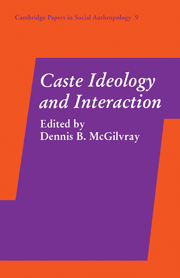Book contents
- Frontmatter
- Contents
- Lists of figures, matrices and tables
- Contributors to this volume
- Note on orthography
- Introduction
- Caste conundrums: Views of caste in a Sinhalese Catholic fishing village
- Mukkuvar vannimai: Tamil caste and matriclan ideology in Batticaloa, Sri Lanka
- Caste rank and verbal interaction in western Tamilnadu
- Caste and politics in India since 1947
- Notes
- Bibliography
- Index
Caste and politics in India since 1947
Published online by Cambridge University Press: 04 August 2010
- Frontmatter
- Contents
- Lists of figures, matrices and tables
- Contributors to this volume
- Note on orthography
- Introduction
- Caste conundrums: Views of caste in a Sinhalese Catholic fishing village
- Mukkuvar vannimai: Tamil caste and matriclan ideology in Batticaloa, Sri Lanka
- Caste rank and verbal interaction in western Tamilnadu
- Caste and politics in India since 1947
- Notes
- Bibliography
- Index
Summary
The science of history proceeds no doubt as the detailed criticism of sociological generalisations … of generalisations so rudimentary and so little analysed that they constitute primitive archetypal images lurking in the background of the historian's consciousness rather than a formed system of ideas. In South Asian studies such images are the simple dichotomies of East and West, tradition and modernity, continuity and change, status and contract, feudalism and capitalism, caste and class … In the present age, the historian must content himself with the role of humble camp follower to the sociologist … But like the sweeper in my regiment who carried the thunder-box of the sahibs through the Arakan campaign there is the hope that in the end it is he and not they who will be awarded the decoration.
(Stokes 1978: 19, 289)Many have claimed that Indian society is in good part constituted by ideas and relations of caste. Many have claimed that Indian politics are too. I shall argue that an influential version of the first claim rests on a series of theoretical mistakes and that a simple version of the second, accepting the most basic of these mistakes and taking a foreshortened view of the facts, is even when corrected at best very partially true.
The belief that Indian society is at least in part constituted by ideas and relations of ‘caste’ rests on two other beliefs, each more general than this and each apparently opposed to the other.
- Type
- Chapter
- Information
- Caste Ideology and Interaction , pp. 204 - 220Publisher: Cambridge University PressPrint publication year: 1982
- 1
- Cited by



